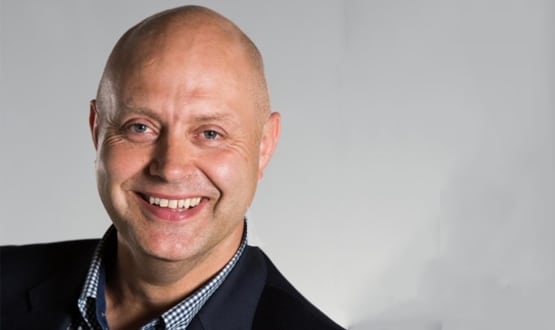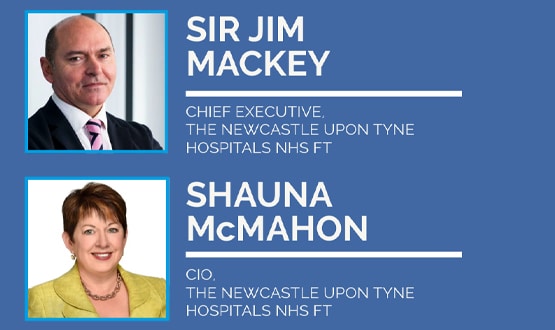The CIO Interview: Paul Charnley, Wirral University Teaching Hospital
- 6 February 2017

Senior NHS CIO leader Paul Charnley has recently been appointed IT and information director at Wirral University Teaching Hospital NHS Foundation Trust, one of the 12 acute global digital exemplars. He speaks to Digital Health News on finding, and keeping, good people and playing his guitar through an iPhone.
Why did you become an NHS CIO?
To make a difference in healthcare. In Wirral, to make a difference to the healthcare of my family and local community.
Within your organisation, what is the most significant digital achievement of the past 12 months?
Phase three of the Wirral Cerner Millennium roll-out which included inpatient documentation, anaesthesia and theatre documentation integration with medical devices.
What will be the most significant of the next 12 months?
Implementation of systems to support Population Health Management combining data and processes from across the different health organisations in Wirral.
What’s the biggest barrier to being a more effective CIO?
Creating and sustaining a skilled team from across all the various disciplines needed to implement and support systems. It’s about recruitment, retention, development.
What’s the biggest barrier the NHS faces overall in achieving digital transformation?
Clarity and focus about what is needed. But that needs to be the whole system and not just demonstrators and exemplars.
If you have one piece of advice for other NHS CIOs, would it be?
Three things: communicate, communicate, communicate.
Who in the NHS do you admire the most?
Front line clinicians, doctors, nurses and allied health practitioners.
If you were given £30 million to spend on digital transformation within your trust, where would that money go?
We already have a programme of work which should see the hospital working digitally and without paper. We really need to deliver 24/7 support to cover seven day working, training so that would require more funding and we could always improve infrastructure.
However, I think we would look to spend this in collaboration with the rest of the community on the kind of interoperability that will support new models of care and population health management including support for social care, care homes, third sector and population itself. A lot of the problems faced by hospitals cannot be solved inside the hospital.

What is the most over-hyped digital innovation in health?
It feels like most digital innovation is over-hyped, from cloud, to Internet of Things, advanced predictive analytics, social media, wearables, you name it, it is offered as the “answer”. What we need is the kind of intelligence which between us helps us cut through the hype and allows us to make informed decisions. Robert Wachter’s “other” book entitled, “The Digital Doctor: Hope, Hype and Harm at the Dawn of Medicine’s Computer Age” is worth a read.
What is the most under-rated digital innovation in health?
A good working basic electronic patient record in every health organisations. Why don’t we do that first?
And a few non-digital questions, what’s the worst job you’ve ever had and why?
Mucking out pigs one very long hot summer in the late 70’s. Do I need to explain why?
If you could invite three people, alive or dead, to dinner who would they be?
My father, grandfather and uncle, because I miss them.
What’s the background image on your home computer?
Whitesands Bay, near St David’s in Pembrokeshire, on a grey and windy day.
What’s your favourite piece of technology at home and why?
Amplitube, which is an app with iRig adaptor that plugs into my guitar and the iPhone. It produces effects for my guitar and makes even me sound not half bad.
If you could have any other job, what would it be?
Artist, a painter.
In a film of your life, who would play you?
Robbie Coltrane or Gérard Depardieu.






5 Comments
Brutal honest as always,, I loved, lets just do the basics, get every trust with a electronic record,. Completely agree so many have an electronic paper record…. 🙁
Absolute classic that the answer to the question: “What is the most significant digital achievement of the past 12 months?” was “Phase three of the Wirral Cerner Millennium roll-out which included … ” and not…
‘The health and care benefits achieved from the rollout were achieved’.
Success yet again measured by the IT input not the care gain result. I despair.
A truly wonderful trust to work with. An amazing digital journey with a team that has ‘seen it through’ from the start.
Great to see the ‘big Acute’ hospital working to include the rest of the care community with interoperability toll support new models of care and population health management.
Providing interoperability and access for social care, care homes, third sector is the next big step
Completely agree! System wide ‘patient centred’ care through access, capacity and transition to downstream resources is key to sustainability. Great to see leadership here towards real progress and support to the front lines.
Comments are closed.